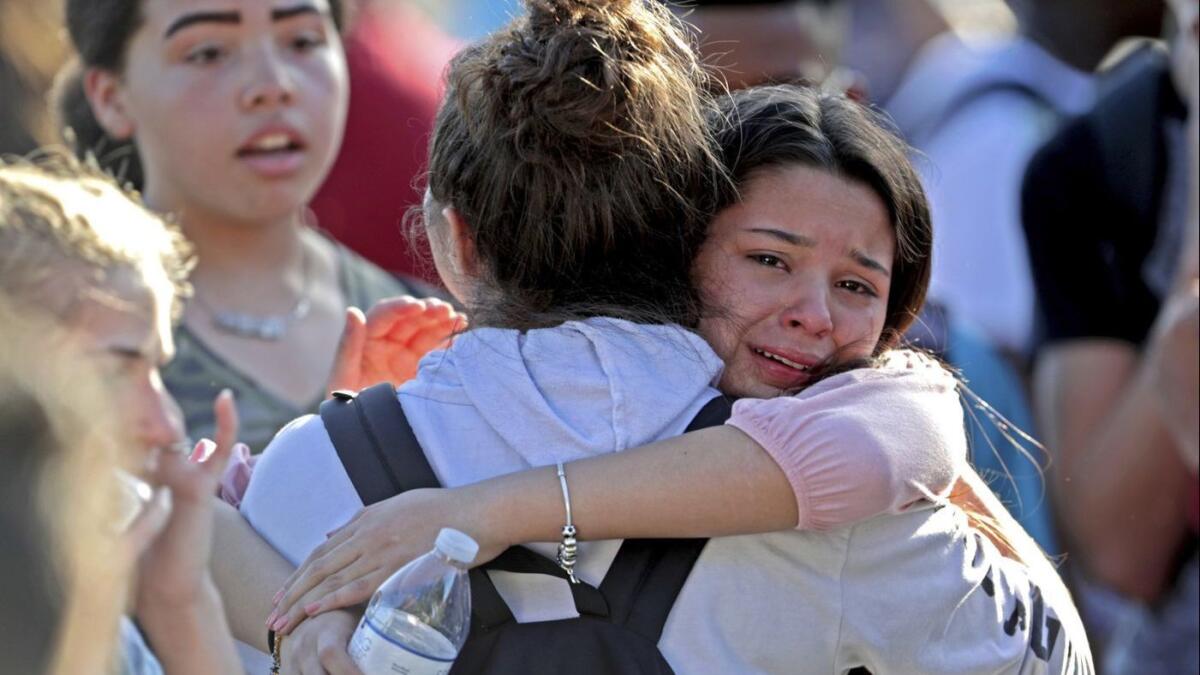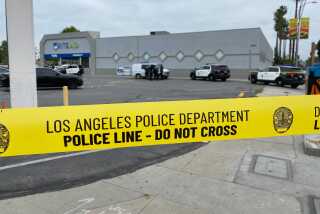Op-Ed: Every solution to mass shootings inevitably involves a serious trade-off

It is, by now, a horrifyingly familiar story. Indeed, the familiarity is what should horrify us the most: A school shooting with a bunch of people dead, many of them children, the rest teachers. This time, it’s a high school in Parkland, Fla., 17 dead, the shooter a 19-year-old who had been expelled from the school. The assailant, armed with a popular rifle and loaded up with ammunition, was injured at the scene.
What can we do? What should we do?
The answers are not easy, and they inevitably involve a trade-off: accepting the unacceptable, or restricting our freedoms. The three big ones are freedom of the press (publicity gives oxygen to these kinds of acts, so restricting coverage will reduce copycats); the right to bear arms (guns don’t cause human evil, but of course they make it easier to carry out); and due process (targeting potential mass shooters, or mentally ill people in general, is possible, but requires us to curtail Americans’ civil rights before they have actually committed a crime).
It is by no means clear that any of these solutions would be more effective than the others, and each of them involves punishing a very large number of people in order to stop the evil-doings of a very small number of people.
The knee-jerk reaction is to go after firearms, but there’s a bait-and-switch element to gun-control arguments in these situations. Activists focus on small restrictions that are palatable to many. If anyone points out that small restrictions won’t do much to stop shootings, the activists argue that larger restrictions, unpalatable to many, would do the trick.
Gun owners are used to hearing, almost in the same breath, “we’ll stop shootings by banning all guns” and “nobody’s trying to take your guns away.”
That doesn’t mean, of course, that it’s impossible to affect any change whatsoever. As with “bump stocks” after the Las Vegas shooting and body armor after this week’s police shooting in Chicago, Parkland is likely to rejuvenate proposals for highly specific restrictions — in this case of smoke bombs and protective gear like gas masks. But a ban on protecting yourself with a gas mask seems a very unsatisfying solution.
As always, human beings are the real weapons of mass destruction.
Censorship presents the same dilemma. The 1st Amendment makes it just as impossible to ban coverage of mass shootings as the 2nd Amendment makes it impossible to ban guns. Media outlets should, if they want to promote safety, refuse to publicize the names of the shooters. But not cover the shootings at all? That could be effective, but these are traumatic and newsworthy community events. Silence is a fantasy; it will never happen.
And even if the mainstream media goes dark, there’s social media. Our exhibitionist culture may encourage disturbed people to perform acts of retribution that guarantee them maximum publicity; think of the mass shooter as taking a selfie of rage. But that genie can’t be put back in the bottle, either, at least not without a massive campaign against freedom of expression.
As always, human beings are the real weapons of mass destruction, and the tools they choose are not the causes of violence. If we want to weed out people who might commit violent acts in the future, we need to scale back due process protections and incarcerate more people on less evidence. Although that too is a trade-off many of us would find it hard to make, we could plausibly target privacy laws that make it difficult to compile records on people with a history of threatening behavior.
Defensive measures are a hollow promise. It’s prohibitively expensive to provide every school, movie theater, workplace, hospital or other “soft target” with an armed guard, and unrealistic to expect grade-school kids to pack heat to stave off the rare but prepared psychopath.
Nor is there a handy social or religious answer. The sickness that leads people — typically young men — to this sort of act may be in some ways emotional or spiritual, but history gives us no reason to believe that there is a key to preventing an angry minority of people from going bad. There never has been, and there never will be.
There are only easy answers if you are willing to sacrifice rights you don’t care about, and that other people do. That’s never been a solution Americans could pursue without embarrassment and regret. Unless and until we can find a better, more reliable way to identify potential mass shooters early, we have to acknowledge the nature of the choice before us: Punish many innocent people or remain mostly defenseless against the malicious few.
Nobody wants to make one side of that trade. But nobody wants to face the other side either.
Dan McLaughlin is an attorney in New York and a contributing columnist to National Review Online.
Follow the Opinion section on Twitter @latimesopinion or Facebook
More to Read
A cure for the common opinion
Get thought-provoking perspectives with our weekly newsletter.
You may occasionally receive promotional content from the Los Angeles Times.










